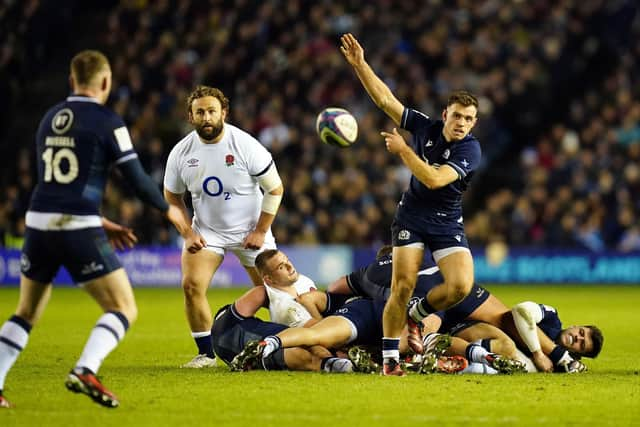Fraser Brown: How Scotland are so good in unstructured transition and counter-attack - and why we must be wary of Italy
I thought Scotland were excellent defensively against England and Duhan van der Merwe’s three tries were brilliant but there were other areas which left room for improvement and will need to be worked upon before what will be an extremely tough match in Rome.
Let’s look at the good stuff first in terms of defence. Scotland won a lot of collisions against England and even in the ones they didn’t win they still managed to get a lot of turnovers. The work around the choke tackle, just trying to hold players up, was really impressive and they probably got more turnovers from that than they expected. It was designed to slow down England’s speed of ball, slow down their momentum and stop their strike runners coming onto the ball with pace. On the face of it England did have a lot of fast ruck ball, but it was all in their own half. Whenever they got in and around the Scotland 22 their ruck moved at glacial pace. Really, the only time they managed to pull it off in an attacking area was for Immanuel Feyi-Waboso’s try in the second half.
Advertisement
Hide AdAdvertisement
Hide AdBen White was excellent for Scotland. He kicked well when needed and his defensive work was superb. He wasn’t just getting in the line to be the extra man, some of the hits he was putting in were momentum-stopping moments.


In the air Scotland were exposed at times, England managed to retain a number of their own kicks, and with the exception of Scotland’s first try, Scotland’s launch never quite got them in behind England as much as they’d hoped.
Where Scotland were excellent, and the area in which they are probably the world’s best, is off unstructured transition and counter-attack. There has been some criticism of Scotland for how much they kick the ball. I think they kick it more than any other team in the Six Nations which may initially seem a bit strange given the players they have at their disposal.
Even this week, I read a column which asked “Why do Scotland kick the ball away? Look at the firepower they have… etc, etc”. To me, it shows a lack of understanding of what Scotland are trying to do. They’ve shown it time and time again, whether it was England last year, Wales this year or England again last week, whenever they get counter-attacking opportunities via broken field running or transition turnover opportunities, there is no better team in the world at exploiting it.
They are ruthless and it’s why they are happy to get into kick-battles and for the game to become a little bit more broken up. There is risk attached but the reward from a Scottish point of view is so high and that’s because they spend so much time working at it in training that the players are brilliant at it.


They’re all on the same page as soon as the ball is turned over or there’s a line break. For the third try against England, Cam Redpath made the break off a rushed kick from Finn Russell and the first person in is White, a one-man ruck and a brilliant clear-out. Then it’s Jamie Ritchie who picks it up and spins the pass out to Russell. One kick from Finn and Duhan is in for the score.
If you compare it to England you’ll see that whenever they had unstructured ball they slowed down their own attack by having forwards in the passing lane between nine and ten, or took time to get into structure. There is a clarity and instinctiveness about Scotland’s attack when in transition and that all comes from the way they train, the messaging and the connections between the players.
England started the game well but Scotland managed to wrestle back control after 15-20 minutes although I’m not sure how the game would have gone if Duhan had not got his second try. It was a scrappy match up to that point. There were 16 unforced handling errors in the first half, six by Scotland and 10 from England, which is ridiculously high for a Test match.
Advertisement
Hide AdAdvertisement
Hide AdIt was a mistake from George Furbank which led to Scotland’s second try which was the key moment. Before that, the game looked to be fizzling out towards half-time after each side had scored a good set-piece try from a scrum launch. They were the only two moments of real quality in the opening half hour.
Scotland’s first try was well constructed. A good stable scrum provided the platform and Finn’s movement out the back did enough to encourage the blitzing Henry Slade to fly out the line. Sione Tuipulotu bounced out late, committing Ollie Lawrence, and Huw Jones is one of the best players in the world at running those lines.
Scotland play a lot of ‘pop-touch’, with guys offloading off the floor, and the big thing that Gregor Townsend always emphasises is to stay in behind the ball carrier so you can go either way depending on how he lands. Huw did well to pop it up to Duhan and it would have been easy for him to pass it on to Kyle Steyn who was outside him but the little show of the ball gave him enough space to get over the line and no-one is going to stop Duhan one-on-one, five metres out.
His second try was just all pace and power. I don’t think there is anyone in world rugby who can produce that sort of electric pace and raw power from a standing start. Ben Earl is no slouch but Duhan left him for dead and the footwork to put himself on the outside straight away was brilliant.
The third try came from an unbelievable bit of skill from Finn and it was the perfect bounce but Duhan still had to read the situation and get on the end of it. The three tries were totally different but all were brilliant bits of skill.
I watched Italy’s game against France in Lille and thought they were hanging on in the first half. They could easily have been 20 or 30 points down but, to be fair to them, they hung on. Sometimes it’s not about being the best team on the park for 80 minutes, it’s about doing what you need to do to make sure you’re still in the game.
I thought Italy did that. They scrapped really hard in the first half and the red card for Jonathan Danty gave them a key advantage in the second half. It gave Italy an opportunity and I thought their try was really well worked. Like Scotland, Italy looked dangerous off of unstructured play and they’ve got some real game-breakers. One criticism I’d have of Italy is that once they get in behind they don’t capitalise on those first two or three phases and seem to get a little bit stuck.
People often ask me why certain players don’t play Test rugby when they look so good at their clubs. The difference is that in Test rugby, when you get a line break or a bit of momentum you have to capitalise within two phases, sometimes even one, because when you get to phase three defences are so good that they are already set.
Advertisement
Hide AdAdvertisement
Hide AdIt’s going to be a really tough game for Scotland in Rome. It might sound a bit strange, but I think if Italy had won that game in Lille it might have been easier for Scotland. A big victory can be energy sapping and emotionally draining and it can take time to recover. But because they didn’t quite get over the line against France there will be the feeling that they still have something to prove.
Playing Italy is always difficult. Even the teams that are beating them by 20 or 30 points find the first 50 minutes really, really hard. Scotland won against England comfortably in the end, probably in third gear, and when was the last time we could say that? If Scotland are to win in Rome and take the championship to a decider in Dublin, they will need to be better next weekend and then again, the weekend after that.
Comments
Want to join the conversation? Please or to comment on this article.
